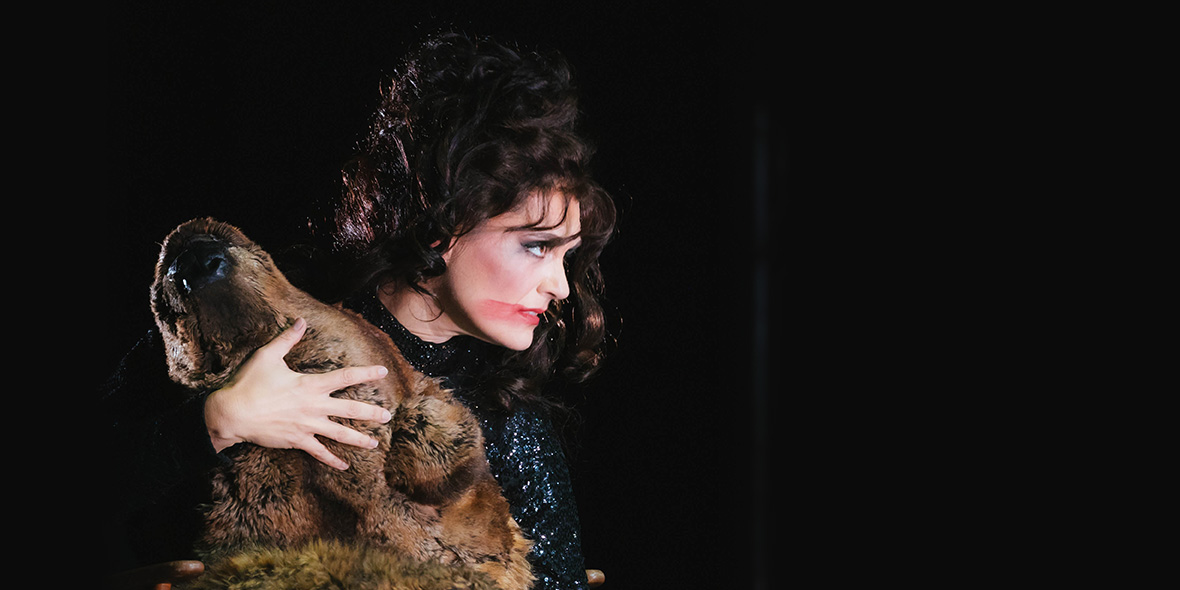Seattle Opera is mounting a relatively obscure opera by Handel, Alcina, with four more performances through October 28. A hat-tip to the Opera for doing Handel operas, and this is the fourth (after Xerxes, Julius Caesar, and Semele). Alcina is a strange choice for the Handel repertoire. Handel is not at his best performed in an opera house three times larger than those of Handel’s time. This one was mounted with cut-down resources (no chorus, a minimal set and costumes, a debut conductor, no double-casting, and a modern orchestra playing well but not in the pointed, dance-based Baroque style). I also found tempos generally too slow.
The star of the show is Spanish soprano Vanessa Goikoetxea, who is the Alcina. She has two of the best and most-affecting arias and performs well as the manic, maddened center of action. Alcina is a tragic heroine, though not in this spare, sexy, abruptly-ending version.
I also liked Ginger Costa-Jackson’s Bradamante. The lesser roles made little impression and had relatively few arias of true Handelian affect. Mozart said of Handel: “He understands effect better than any of us. He strikes like a thunderbolt.” True, but not often in this opera. The great aria by Alcina, “Ah! My Heart,” is reason enough to see this opera. Here’s a version sung and conducted by Nathalie Stutzmann that has the bite and dissonance and passion of real Baroque orchestral playing.
Why do it, then? It is a star turn for the Alcina, who has mad scenes and seductions. General Director Christina Scheppelmann has found a fine soprano and actor in Goikoetxea. The interpretation made something of the gender-switching, trans-y component of the opera, giving it a modest contemporary shiver.
For the rest, the opera, based on Ariosto’s Orlando Furioso, is hard to follow and puzzling about its larger point (Enlightenment triumphing over magic, love over license?). There are some odd directorial touches, such as characters stripping down to underwear, and curious climaxes when the rack of overhead lights is lowered. But mostly the singers have to maneuver awkwardly around 10 moderne armchairs and in front of a screen with jungle and island imagery. In the story, Alcina presides over a mysterious island, where she tires of lovers and turns them into plants — until she curiously falls in love and becomes a sympathetic figure with grand Handel music, at the end enriched by horns.

Alcina dates to 1735, a few years before Handel as an opera impresario and composer gave up doing literary Italian operas and shifted to oratorios with more choral affect. He was shortly to suffer a mild stroke, also leading to his change of direction. This late opera in the Italian tradition, the second of his “magic” operas (after Orlando in 1733), shows all too well his declining commitment to such Italian opera.
There had been a grand surge all over Europe in Italian opera, featuring Italian texts, castrati singers, and vocal pyrotechnics. The audiences were mostly upper-class sophisticates, while Handel himself had an ordinary upbringing (his father was a barber). He soon found his way back to a broader audience and Bible-based librettos with Britain celebrated as a later Israel.
His lovely, heartfelt music combined German harmonic structure, Italian lyricism, and British choral grandeur. Beethoven marveled at the way Handel (“the greatest composer who ever lived”) managed “to achieve great effects by such simple means.”
One of the great dissonances in music history is that from Monteverdi to Handel fine composers wrote operas, but the operatic form and its tyranny by singers meant that there was little dramatic power until Gluck and Mozart. That dramatic form awaits the next century, and Alcina is bereft of dramatic punch. Lying too deep below the surface of this mish-mash of an opera is the Roland story of a heroic, doomed knight, here Ruggiero (countertenor Randall Scotting), who is challenged by adventures (such as the Alcina-like Circe, the enchantress of Greek legend).
The Handel revival dates to Beverly Sills and the New York City Opera. The revival of Baroque opera was helped by the rise of interest in early music (as in Seattle), the surge of countertenors, and the availability of directors who make dramatic sense of these static works. Opera is undergoing all sorts of creative spurts these days, and I wonder and hope that Seattle Opera, with its straitened means, will be able to maintain momentum after the departure of the very experienced and agile general director, Scheppelmann. She decamps to Brussels at the end of this 60th anniversary season of Seattle Opera.
Tickets for Alcina are at this website: https://www.seattleopera.org/performances-events/alcina/. Remaining performances are October 20, 22, 25, and 28.
Discover more from Post Alley
Subscribe to get the latest posts sent to your email.
